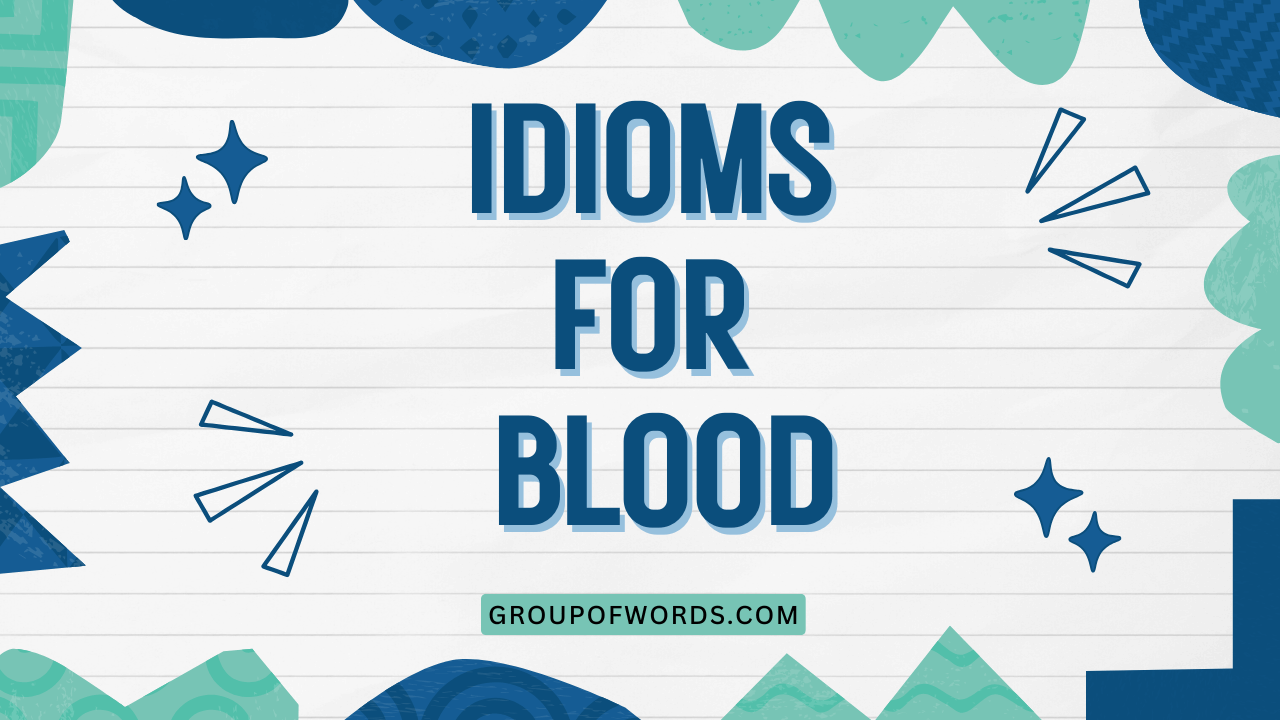Idioms for Blood: A Comprehensive Guide
Idioms enrich the English language, adding color and depth to communication. Among the most vivid and frequently used are those related to “blood.” Understanding these idioms is crucial for comprehending both spoken and written English, as they often convey meanings beyond their literal interpretations.
This article provides a comprehensive exploration of idioms involving “blood,” covering their definitions, origins, usage, and common pitfalls. This guide will benefit English language learners, writers, and anyone seeking to enhance their understanding of idiomatic expressions.
Table of Contents
- Introduction
- What are Idioms for Blood?
- Structural Breakdown
- Types of Blood Idioms
- Examples of Blood Idioms
- Usage Rules for Blood Idioms
- Common Mistakes with Blood Idioms
- Practice Exercises
- Advanced Topics
- Frequently Asked Questions
- Conclusion
Introduction
Idioms are phrases or expressions whose meanings cannot be understood from the literal meanings of the individual words. They are a vital part of mastering any language, and English is no exception.
Idioms related to “blood” are particularly rich and varied, often reflecting deep-seated cultural beliefs and historical contexts. By learning these idioms, you gain a deeper insight into the nuances of the English language and enhance your ability to communicate effectively and expressively.
What are Idioms for Blood?
Idioms for “blood” are expressions that use the word “blood” (or related terms like “bloody”) in a figurative sense to convey a meaning different from its literal definition. These idioms draw on the symbolic significance of blood, which is often associated with family, life, passion, anger, heritage, and sacrifice.
The function of these idioms is to add color, emphasis, and emotional impact to language. They are commonly used in both formal and informal contexts, although some may be more appropriate for certain situations than others.
Structural Breakdown
The structural elements of blood idioms vary significantly. Some idioms are simple phrases, while others are more complex clauses or sentences.
Many involve prepositions (e.g., “in cold blood”), verbs (e.g., “make someone’s blood boil”), or adjectives (e.g., “blood-curdling”). The word “blood” itself can function as a noun, adjective, or part of a compound word within the idiom.
Understanding the grammatical structure of each idiom is essential for using it correctly and interpreting its meaning accurately. Recognizing these elements allows for better recall and application of the idioms in various contexts.
Types of Blood Idioms
Blood idioms can be categorized based on the themes or concepts they represent. Here are some common categories:
Blood Relationships
These idioms relate to family ties, kinship, and ancestry. They often emphasize the strong bonds and shared characteristics among family members.
They can also highlight the importance of heritage and lineage.
Emotional State
These idioms describe intense feelings such as anger, fear, excitement, or shock. They often use the imagery of blood to convey the physical sensations associated with these emotions, such as a racing heart or a flushed face.
Origins and Heritage
These idioms refer to a person’s background, descent, or cultural identity. They often use the concept of blood to symbolize the qualities or characteristics inherited from one’s ancestors.
Sacrifice and Suffering
These idioms describe situations involving pain, hardship, or loss, often associated with making a significant contribution or enduring a difficult experience.
Temperament and Character
These idioms refer to a person’s inherent nature, disposition, or personality traits. They often use the concept of blood to suggest that certain qualities are innate or deeply ingrained.
Examples of Blood Idioms
Below are examples of blood idioms categorized by the themes discussed above. Each category provides a range of examples to illustrate the diverse ways in which “blood” is used figuratively in English.
Blood Relationships Examples
The following table provides idioms related to blood relationships. These idioms highlight the importance of family ties and lineage.
| Idiom | Meaning | Example Sentence |
|---|---|---|
| Blood is thicker than water | Family bonds are stronger than other relationships. | Despite their disagreements, they always support each other because blood is thicker than water. |
| Blood relative | A person related by birth, not marriage. | She’s not just a friend; she’s a blood relative, my cousin. |
| In the blood | An inherent or natural part of someone’s character. | Singing is in her blood; her mother was a famous opera singer. |
| Of the same blood | Having the same ancestry or family. | They may have different opinions, but they are of the same blood. |
| Royal blood | Of noble or aristocratic descent. | She was rumored to have royal blood in her ancestry. |
| New blood | New people or ideas that bring freshness and vitality. | The company needed new blood to revitalize its outdated practices. |
| Bad blood | Feelings of hatred or animosity. | There’s been bad blood between the two families for generations. |
| Blue blood | Of aristocratic or upper-class descent. | He was born into a family with blue blood. |
| To get one’s blood up | To become angry or excited. | The injustice got his blood up, and he started to protest. |
| A chip off the old block | Someone who resembles their parent in character or behavior. | He’s a chip off the old block, just as stubborn as his father. |
| Like father, like son | Sons tend to behave like their fathers. | He became a doctor, just like his father; like father, like son. |
| Runs in the family | A trait or characteristic that is common among family members. | Their musical talent runs in the family. |
| Related by marriage | Connected through marital ties, not direct bloodline. | My sister’s husband is related to me by marriage. |
| Family ties | The bonds and connections between family members. | Despite the distance, they maintained strong family ties. |
| Close-knit family | A family with strong emotional bonds and frequent interaction. | They come from a close-knit family who always support each other. |
| Distant relative | A relative who is not closely related. | He’s a distant relative, I haven’t seen him in years. |
| Next of kin | The closest living relative. | His next of kin was notified after the accident. |
| Parental guidance | The advice and support provided by parents. | The child needed parental guidance to make the right decisions. |
| Kin and kith | Friends and relatives. | We invited all our kin and kith to the wedding. |
| Blood brother | A man who has sworn brotherhood with another man, typically in a ceremony involving the symbolic mingling of blood. | They became blood brothers after sharing a life-threatening experience. |
| Aunt Sally | A person or thing set up as an easy target for criticism or attack, often a relative. | The politician used his aunt as an Aunt Sally to deflect criticism. |
| Family name | The surname or last name that is shared by members of a family. | He wanted to uphold the family name and its reputation. |
| Family tree | A diagram showing the lineage of a family, including ancestors and descendants. | They traced their family tree back several generations. |
| Founding father | A person who played a significant role in establishing a nation or organization, often an ancestor. | He was considered one of the founding fathers of the company. |
Emotional State Examples
The following table provides idioms related to emotional states. These idioms often use the imagery of blood to convey the intensity of feelings.
| Idiom | Meaning | Example Sentence |
|---|---|---|
| Make someone’s blood boil | To make someone extremely angry. | The politician’s lies made my blood boil. |
| Blood-curdling | Causing terror or horror. | We heard a blood-curdling scream from the haunted house. |
| In cold blood | Without emotion; deliberately and ruthlessly. | The crime was committed in cold blood. |
| Blood runs cold | To feel sudden fear or dread. | My blood ran cold when I saw the shadowy figure. |
| Fresh blood | New energy, enthusiasm, or resources. | The project needed fresh blood to succeed. |
| Young blood | Young people with energy and new ideas. | The company hired young blood to modernize its operations. |
| To have blood on one’s hands | To be responsible for someone’s death or suffering. | The dictator had blood on his hands for the atrocities he committed. |
| Blood, sweat, and tears | Extreme effort and hard work. | He put blood, sweat, and tears into building his business. |
| To sweat blood | To work extremely hard and worry a lot. | I sweated blood to finish the project on time. |
| To be out for blood | To be seeking revenge or punishment. | After the betrayal, he was out for blood. |
| Blood sport | A sport involving the shedding of animal blood, such as hunting or bullfighting; something that causes excitement at the expense of others. | Politics can often seem like a blood sport. |
| To freeze someone’s blood | To cause someone to feel intense fear or shock. | The chilling story froze her blood. |
| To stir one’s blood | To excite or arouse someone. | The adventure stirred his blood. |
| To make one’s blood race | To cause excitement or exhilaration. | The car chase made her blood race. |
| Like a red rag to a bull | Something that is certain to provoke anger. | His arrogant attitude was like a red rag to a bull. |
| To get the blood pumping | To cause excitement or energy. | The workout got my blood pumping. |
| To send shivers down someone’s spine | To cause a feeling of fear or excitement. | The eerie music sent shivers down her spine. |
| To be in a frenzy | To be in a state of wild excitement or agitation. | The crowd was in a frenzy after the victory. |
| Heart-stopping | Very exciting or frightening. | The movie had several heart-stopping moments. |
| Nervous energy | Restless or agitated energy caused by anxiety or excitement. | He paced the room, filled with nervous energy. |
| On edge | Anxious or nervous. | She was on edge waiting for the results. |
| Worked up | Excited, agitated, or angry. | He got all worked up over the minor disagreement. |
| In a sweat | Anxious or worried. | I was in a sweat waiting for the interview. |
| Hair-raising | Very frightening. | The roller coaster ride was hair-raising. |
Origins and Heritage Examples
The following table provides idioms related to origins and heritage. These idioms often use “blood” to symbolize inherited qualities.
| Idiom | Meaning | Example Sentence |
|---|---|---|
| In one’s blood | An inherent quality or characteristic. | A love for adventure is in his blood. |
| Of noble blood | Of aristocratic or upper-class descent. | She was of noble blood, descended from royalty. |
| Pure blood | Of unmixed ancestry, often used in a discriminatory context. | The old families claimed to have pure blood. |
| New blood | New members or ideas that can revitalize an organization or system. | The company needed new blood to bring fresh perspectives. |
| To be born in the purple | To be born into a position of power or privilege. | He was born in the purple and never had to struggle. |
| To have something in one’s DNA | To have an inherent or natural talent or characteristic. | She has a natural talent for music; it’s in her DNA. |
| Rooted in history | Having a long and significant history. | The tradition is rooted in history and culture. |
| From humble beginnings | Starting from a low or disadvantaged position. | He rose to success from humble beginnings. |
| A long line of | A series of ancestors or predecessors. | She comes from a long line of doctors. |
| Tracing one’s roots | Investigating one’s ancestry and family history. | He spent years tracing his roots. |
| Legacy of | Something handed down from the past, such as a tradition or achievement. | The artist left behind a lasting legacy. |
| Heritage of | The traditions, achievements, and beliefs that are part of the history of a group or nation. | The country has a rich cultural heritage. |
| Ancestral home | The home of one’s ancestors. | They visited their ancestral home in Ireland. |
| Family tradition | A custom or belief that is passed down through generations. | They followed the family tradition of baking cookies every Christmas. |
| National identity | A sense of belonging to a particular nation, often based on shared culture and history. | The festival celebrated the national identity. |
| Cultural roots | The origins and traditions of a particular culture. | They explored their cultural roots through music and dance. |
| Indigenous people | The original inhabitants of a particular region. | The project aimed to support indigenous people. |
| First generation | The first members of a family to be born or raised in a new country. | She was a first-generation immigrant. |
| Second generation | The children of immigrants who were born in a new country. | He was a second-generation American. |
| Passing down | Transmitting something to future generations. | They passed down their knowledge to the next generation. |
| From way back | From a long time ago. | Their family has been in the area from way back. |
| Ancient lineage | A family line that dates back to ancient times. | The family claimed an ancient lineage. |
| Historical significance | The importance of something in history. | The site has great historical significance. |
Sacrifice and Suffering Examples
The following table provides idioms related to sacrifice and suffering. These idioms often use “blood” to symbolize pain and hardship.
| Idiom | Meaning | Example Sentence |
|---|---|---|
| Blood, sweat, and tears | Extreme effort and hard work, especially involving suffering. | He put blood, sweat, and tears into building his business. |
| Sweat blood | To work extremely hard and worry a lot. | I sweated blood to finish the project on time. |
| Pay with blood | To suffer greatly or be killed as a consequence of something. | The soldiers paid with blood to defend their country. |
| Draw blood | To cause injury or harm. | The argument drew blood, leaving both sides hurt. |
| To bleed dry | To exhaust someone’s resources or energy. | The project bled the company dry. |
| To bleed for someone | To suffer or sacrifice for someone else. | He would bleed for his family. |
| A pound of flesh | Something that is claimed as due, even if it causes great suffering to the person giving it. | The lender demanded his pound of flesh. |
| To go through the mill | To undergo a difficult or trying experience. | He went through the mill during the recession. |
| To bear the brunt | To endure the worst part of something. | The small businesses bore the brunt of the economic downturn. |
| To suffer in silence | To endure pain or hardship without complaining. | She suffered in silence for years. |
| To take a beating | To suffer a defeat or setback. | The team took a beating in the championship game. |
| To weather the storm | To survive a difficult period. | The company weathered the storm and emerged stronger. |
| To go the extra mile | To make an extra effort. | He always goes the extra mile for his clients. |
| To give one’s all | To put in maximum effort. | She gave her all to the performance. |
| To spare no effort | To do everything possible to achieve something. | They spared no effort to find the missing child. |
| To sacrifice everything | To give up all that is important to you. | He sacrificed everything for his family. |
| To put one’s life on the line | To risk one’s life. | The firefighters put their lives on the line to save the building. |
| To be at one’s wit’s end | To be at the limit of one’s mental resources. | She was at her wit’s end trying to solve the problem. |
| To reach breaking point | To reach the point where one can no longer cope with stress or pressure. | He reached breaking point after months of overwork. |
| To hit rock bottom | To reach the lowest point in one’s life. | He hit rock bottom after losing his job and his home. |
| To pull oneself up by one’s bootstraps | To improve one’s situation through one’s own efforts. | He pulled himself up by his bootstraps and became successful. |
| To rise from the ashes | To recover from a devastating experience. | The city rose from the ashes after the earthquake. |
Temperament and Character Examples
The following table provides idioms related to temperament and character. These idioms often use “blood” to suggest innate qualities.
| Idiom | Meaning | Example Sentence |
|---|---|---|
| Cold-blooded | Lacking emotion or compassion; ruthless. | The cold-blooded killer showed no remorse. |
| Hot-blooded | Passionate and easily angered. | He was a hot-blooded young man, always ready for a fight. |
| In the blood | An inherent part of one’s character or nature. | A love for music is in her blood. |
| Bad blood | Feelings of animosity or resentment. | There was bad blood between the two families. |
| To have a short fuse | To be easily angered. | He has a short fuse and gets angry easily. |
| To wear one’s heart on one’s sleeve | To openly display one’s emotions. | She wears her heart on her sleeve and is very expressive. |
| To be thick-skinned | To be insensitive to criticism or insults. | He’s thick-skinned and doesn’t care what people say. |
| To be thin-skinned | To be easily offended or hurt by criticism. | She’s thin-skinned and gets upset easily. |
| To have a heart of gold | To be kind and generous. | She has a heart of gold and always helps others. |
| To be a soft touch | To be easily persuaded to give money or help. | He’s a soft touch and always gives to charity. |
| To be a tough cookie | To be strong and resilient. | She’s a tough cookie and can handle anything. |
| To be a go-getter | To be ambitious and energetic. | He’s a go-getter and always achieves his goals. |
| To be a people person | To be good at interacting with people. | She’s a people person and enjoys working with others. |
| To be a lone wolf | To prefer to work alone. | He’s a lone wolf and prefers to work independently. |
| To be a team player | To work well with others. | She’s a team player and contributes to the group’s success. |
| To have a strong personality | To have a distinctive and assertive character. | He has a strong personality and is not easily influenced. |
| To be a natural leader | To have the inherent qualities of a leader. | She’s a natural leader and inspires others. |
| To be a quick thinker | To be able to think and react quickly. | He’s a quick thinker and can solve problems easily. |
| To be a deep thinker | To be thoughtful and reflective. | She’s a deep thinker and enjoys philosophical discussions. |
| To be a free spirit | To be independent and unconventional. | He’s a free spirit and lives life on his own terms. |
| To be down to earth | To be practical and realistic. | She’s down to earth and has a realistic view of life. |
| To be easygoing | To be relaxed and tolerant. | He’s easygoing and doesn’t get stressed easily. |
| To be uptight | To be tense and anxious. | She’s uptight and worries about everything. |
Usage Rules for Blood Idioms
When using blood idioms, it’s important to consider the context and audience. Some idioms are more formal than others, and some may be considered offensive in certain situations.
It is also essential to understand the precise meaning of each idiom to avoid misusing it. Pay attention to the grammatical structure of the idiom and ensure that it fits correctly into the sentence.
For example, “make someone’s blood boil” requires a subject that causes anger, while “blood runs cold” describes a feeling of fear experienced by someone.
Common Mistakes with Blood Idioms
One common mistake is taking blood idioms literally, which can lead to confusion and miscommunication. Another mistake is using the wrong form of the idiom, such as saying “making my blood boil” instead of “make my blood boil.” It’s also important to be aware of the connotations of each idiom and avoid using those that are inappropriate for the situation.
Here are some examples of common mistakes:
| Incorrect | Correct | Explanation |
|---|---|---|
| Blood is more thick than water. | Blood is thicker than water. | The idiom is “thicker than water,” not “more thick than water.” |
| He made that my blood boil. | That made my blood boil. | The subject causing the anger should be “that” or something similar. |
| My blood was run cold. | My blood ran cold. | The correct form is “blood ran cold,” not “was run cold.” |
| She has blue blood in her veins, literally. | She is from a blue blood family. | “Blue blood” is a figurative term for aristocracy, not literal blue blood. |
Practice Exercises
Test your understanding of blood idioms with the following exercises. Fill in the blanks with the appropriate idiom from the list provided.
Idiom List: blood is thicker than water, make someone’s blood boil, in cold blood, blood runs cold, fresh blood, have blood on one’s hands, blood, sweat, and tears, out for blood, in the blood, stir one’s blood.
| Question | Answer |
|---|---|
| 1. Despite their arguments, __________ and they always support each other. | blood is thicker than water |
| 2. The politician’s corrupt actions __________ of many citizens. | make someone’s blood boil |
| 3. The assassin committed the crime __________, showing no remorse. | in cold blood |
| 4. My __________ when I heard the ghostly sounds in the old house. | blood runs cold |
| 5. The company needs __________ to revitalize its outdated practices. | fresh blood |
| 6. The dictator __________ for the thousands of lives lost under his regime. | has blood on one’s hands |
| 7. He achieved success through __________, dedicating himself entirely to his work. | blood, sweat, and tears |
| 8. After being betrayed, he was __________ seeking revenge. | out for blood |
| 9. A love for music is __________; her mother was a famous singer. | in the blood |
| 10. The adventure and the unknown __________ and made him feel alive. | stir one’s blood |
Exercise 2: Choose the correct idiom to complete each sentence.
| Question | Options | Answer |
|---|---|---|
| 1. He __________ to finish the project on time. | (a) spilled blood (b) sweated blood (c) shed blood | (b) sweated blood |
| 2. The company was __________ by the economic crisis. | (a) bled dry (b) bled red (c) bled out | (a) bled dry |
| 3. The lawyer demanded his __________. | (a) piece of cake (b) pound of flesh (c) ounce of gold | (b) pound of flesh |
| 4. The two families have had __________ between them for years. | (a) good blood (b) bad blood (c) warm blood | (b) bad blood |
| 5. The news __________ down her spine. | (a) sent flowers (b) sent chills (c) sent shivers | (c) sent shivers |
| 6. He is known to __________, making decisions without empathy. | (a) act warm-blooded (b) act cold-blooded (c) act hot-blooded | (b) act cold-blooded |
| 7. She wanted to __________ after the injustice she faced. | (a) be out for mud (b) be out for blood (c) be out for tears | (b) be out for blood |
| 8. The challenging hike really __________. | (a) got the blood boiling (b) got the blood draining (c) got the blood pumping | (c) got the blood pumping |
| 9. They are related by __________ and share many similarities. | (a) marriage ties (b) water ties (c) blood ties | (c) blood ties |
| 10. He is a __________ and often reacts impulsively. | (a) cold-blooded person (b) hot-blooded person (c) mild-blooded person | (b) hot-blooded person |
Advanced Topics
For advanced learners, exploring the etymology and historical context of blood idioms can provide a deeper understanding of their meaning and usage. Researching the cultural significance of blood in different societies can also shed light on the origins of these expressions.
Additionally, analyzing how blood idioms are used in literature and film can enhance your appreciation of their artistic and rhetorical impact. Consider how idioms evolve over time and how new idioms emerge to reflect changing social and cultural landscapes.
Frequently Asked Questions
Here are some frequently asked questions about idioms for blood:
- What is the difference between a literal and a figurative meaning?
The literal meaning of a word or phrase is its direct, dictionary definition. The figurative meaning, on the other hand, is a symbolic or metaphorical interpretation that goes beyond the literal definition. Idioms are examples of figurative language.
- Why is it important to learn idioms?
Learning idioms is important because they are commonly used in everyday language and can significantly enhance your understanding of spoken and written English. Idioms add color, expressiveness, and cultural nuance
to communication. They allow you to express complex ideas in a concise and memorable way.
- Are blood idioms universal across all cultures?
No, blood idioms are not universal. While some themes may be common across cultures (e.g., family relationships), the specific expressions and their meanings can vary significantly. What is considered appropriate in one culture may be offensive or nonsensical in another.
- How can I improve my understanding of blood idioms?
To improve your understanding of blood idioms, read widely, listen to native English speakers, and pay attention to the context in which idioms are used. Practice using idioms in your own speaking and writing, and don’t be afraid to ask for feedback from native speakers. Additionally, studying the origins and etymology of idioms can provide valuable insights into their meanings.
- What are some resources for learning more about idioms?
There are many resources available for learning more about idioms, including dictionaries, textbooks, websites, and language learning apps. Some popular resources include the Oxford Dictionary of Idioms, the Cambridge Idioms Dictionary, and websites like UsingEnglish.com and TheFreeDictionary.com. Additionally, watching English-language films and TV shows can expose you to a wide range of idioms in context.
Conclusion
Blood idioms are a fascinating and essential part of the English language. They enrich communication, add depth to expression, and reflect cultural values and historical contexts.
By understanding the meanings, origins, and usage rules of these idioms, you can enhance your comprehension of English and communicate more effectively. Whether you are a language learner, a writer, or simply someone who appreciates the nuances of language, mastering blood idioms will undoubtedly enrich your linguistic skills and cultural awareness.
Keep practicing, keep exploring, and enjoy the colorful world of English idioms!






